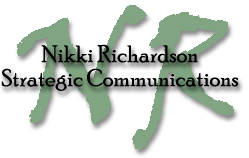

Crisis Communications Management
Preparing for the Unpredictable --
What to Expect from the Crisis Communications Management Program
Winston Churchill was fond of saying that the Chinese ideogram for
"crisis" is composed of the two characters that separately mean
"danger" and "opportunity." Tipping the balance in that equation
depends upon planning and practice.
Most companies that emerge from a crisis event successfully have
several things in common. They have a living crisis communications
plan.
They regularly conduct crisis drills and they candidly critique their
own readiness and
performance.
Our program is designed to assist organizations in developing crisis plans or
refining existing plans, training crisis spokespeople and conducting realistic mock crisis
exercises either on tabletop or through total simulations. We also offer consulting
services during crises.
Goals
The Crisis Communications Management Program in full, or in part, is designed to help companies:
1. Understand their crisis vulnerabilities
2. Develop a plan of action to follow when a crisis strikes
3. Develop trained spokespeople
4. Test readiness and performance through crisis drills
Critical Success Factors
Experience has taught us that these are the critical success factors for an effective crisis program:
1. Endorsement of senior management
2. Commitment of time and resources for planning, training and simulations
3. Commitment to regularly review and refine the plan
Elements of the Crisis Communications Management Program
The Crisis Communications Management Program consists of the following elements that, depending upon the company's progress in crisis planning, can be selected in total or in part:
Crisis Audit - Conduct an audit that addresses these two critical areas:
Susceptibility - Assess the organization's vulnerabilities, which operations can go wrong and become highly visible quickly.
Capability - Assess the organization's ability to detect a crisis at an early stage, manage a crisis when it hits and ultimately benefit from the experience.
Crisis Plan - Develop a plan that anticipates the possibilities; identifies the crisis team, designates one primary spokesperson, and provides 24/7 access numbers for all of them; assigns responsibilities both within and outside the team; identifies the locations for critical tasks; plays out the scenarios and identifies and lists the affected constituents, including key company and external contacts that require early notification and, above all, has senior management buy-in.
Crisis Team - Identify a crisis team consisting of both permanent members and ad-hoc members who are chosen for their areas of expertise. The best teams are composed of members who are creative enough to think the unthinkable, knowledgeable enough about how the company really works to pose viable solutions and powerful enough to act on the solution with authority. All members should be crisis-trained and willing to be available on a 24-hour basis during a crisis.
Crisis Drills - Schedule periodic crisis simulations. They can range in complexity from tabletop exercises to full-blown drills enlisting the participation of outside emergency agencies and consultants.
Evaluation and Refinement - Candidly critique your company's readiness for a crisis and its performance during a simulation or the real thing. Reviews help companies learn from both successes and failures.
Crisis Counsel - Provide counsel for communications management during developing issues or crises.
NIKKI RICHARDSON
STRATEGIC COMMUNICATIONS
THREE LANCASTER AVENUE, CHELMSFORD MA 01824
Phone 978.256.1651-- Fax 978.256.0751